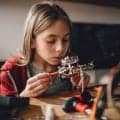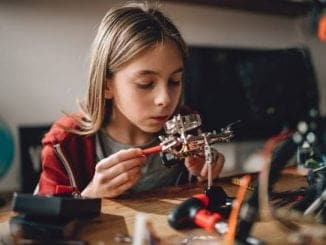
Homeschool Hands-On Science Curriculum
Homeschool Hands-On Science Curriculum, What makes "difficult subjects", such as science, so difficult to teach and to learn? It could be that the concepts aren't quite as easy to learn via rote memorization or by simply reading about them in books. Based on how people learn, science is a subject that is best taught by using hands-on experimentation and relating it to the physical world around us.
Homeschool Hands-On Science Curriculum-Why Is Science So Hard?
Science often gets a bad rap as being one of those subjects we need to teach our kids - but since we don't understand it all that well ourselves, we dread teaching it and our kids can't get excited it about learning it, either. And that's a real shame because children love science before any formal schooling takes place. According to the Science Education National Academies Press Book, How People Learn, gaining knowledge about science is a natural part of development, "Developmental researchers have shown that young children understand a great deal about basic principles of biology and physical causality, about number, narrative, and personal intent, and that these capabilities make it possible to create innovative curricula that introduce important concepts for advanced reasoning at early ages."
Homeschool Hands-On Science Curriculum Understanding
So we know that young kids can innately understand science... why do they have a difficult time learning it in school?One problem is that homeschool teachers expect to be able to purchase a science textbook, open it up, and start teaching straight from its pages. This presents several problems, however. For one, it's boring. Kids don't get excited about seeing things on the pages of a book. For another, it's ineffective. This type of teaching promotes rote memorization. That's difficult for most of us because we have so much data in our brains already and years later, we usually forget most of that information because it's not tied to other, more important areas of our lives.
Homeschool Hands-On Science Curriculum Teaching
Fortunately, you don't have to thoroughly understand the topics you teach. What if you could learn along with your child? There is a way to do this, and it involves finding a curriculum that supports this type of study. It's referred to as "building block" methodology that introduces students to essential topics first, then builds on that foundation to introduce more and more complex topics. This logical progression allows students to begin understanding science at an early age and even learn college-level science by the time they are in middle school.
Homeschool Hands-On Science Curriculum Importance
Not only should science education use a building block approach, it should serve as more of a guide rather than a listing of dry, hard facts. In order to help students come to the "right" conclusions, an effective science curriculum sets up the scenario, then allows students to explore the concepts in a hands-on manner. This occurs while connecting the new concepts to information they already know, thus allowing them to assimilate science in real life situations. In other words, students form a hypothesis based on science learning, then perform an experiment to prove or disprove the belief. This is how real scientists work and how kids are best able to understand real science.
Homeschool Hands-On Science Curriculum Summary
When you are considering any homeschool science curriculum, look for a depth of understanding over a breadth of knowledge. It's not important to cram a bunch of science "facts" into a student's head; what is important is allowing him or her to explore and have fun with the process of science. Doing science rather than simply memorizing it is what results in true comprehension.








